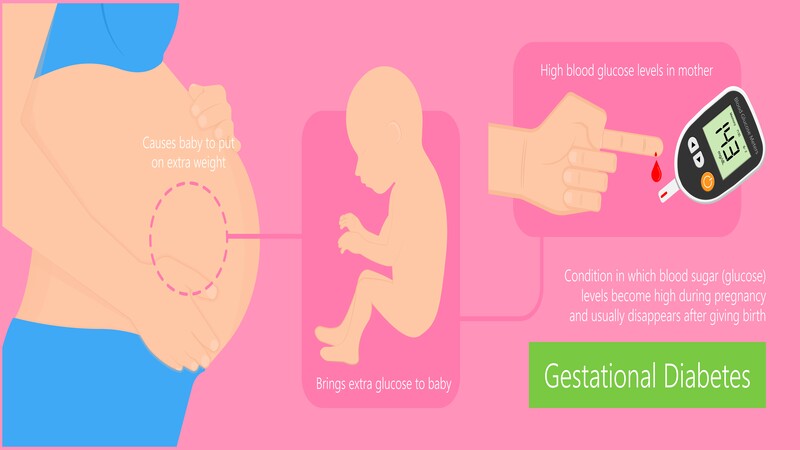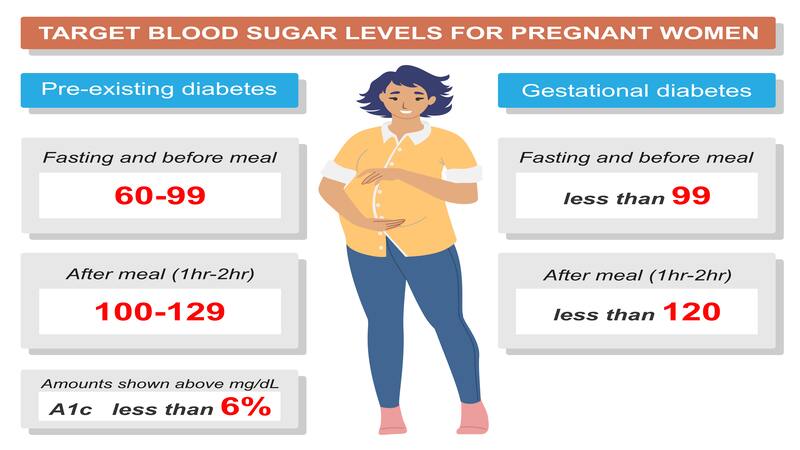 Receiving a diagnosis of gestational diabetes can be overwhelming for many expectant women, who may worry about the impact on their precious ones. Well, gestational diabetes is quite common these days, and with a few tips, you will be able to manage it well.
Receiving a diagnosis of gestational diabetes can be overwhelming for many expectant women, who may worry about the impact on their precious ones. Well, gestational diabetes is quite common these days, and with a few tips, you will be able to manage it well.
With careful monitoring and treatment, you will be able to achieve a safe pregnancy. You would have seen many women taking insulin shots. If the sugar levels are not adequately managed with lifestyle changes, then doctors prescribe insulin. Read along more to find out about the efficacy, instructions to use, and safety of using insulin during pregnancy.
What Is Insulin?
Insulin is a hormone produced by the pancreas that plays an important role in blood glucose regulation [1]. It allows the body cells to absorb glucose from the bloodstream and store it for future use. If the amount of insulin is too low, the body cannot absorb glucose, resulting in increased blood sugar levels (hyperglycemia) [2]. If the amount of insulin increases abnormally, more glucose is absorbed from the blood resulting in too low blood sugar level (hypoglycemia). Neither of these are favorable during pregnancy.
When Should A Pregnant Woman Take Insulin?
 If you develop gestational diabetes and your blood glucose levels remain high despite a well-controlled diet and regular exercise, insulin shots are recommended [3]. It helps to regulate blood glucose levels to keep the mother and baby healthy. Your healthcare provider will decide upon the type of insulin and the dosage based on your daily glucose levels and overall health assessment.
If you develop gestational diabetes and your blood glucose levels remain high despite a well-controlled diet and regular exercise, insulin shots are recommended [3]. It helps to regulate blood glucose levels to keep the mother and baby healthy. Your healthcare provider will decide upon the type of insulin and the dosage based on your daily glucose levels and overall health assessment.
What is Gestational Diabetes?
Gestational Diabetes is a type of diabetes that is diagnosed for the first time during pregnancy [4]. It causes high sugar levels in the body that can be potentially harmful to both the mother and the baby. Most of the time, gestational diabetes resolves after delivery, but the risk of having type 2 diabetes increases in the future [5]. Good dietary control and regular exercise along with medications or insulin help in managing gestational diabetes.
Is It Safe To Take Insulin During Pregnancy?
 Yes, it is quite safe to take insulin if you develop gestational diabetes during pregnancy or have pre-existing diabetes. Insulin administered during pregnancy does not cross the placenta in significant amounts [6]. Hence, it lowers the mother’s blood glucose levels without affecting the fetus. It will contribute towards reducing the complications of high blood sugar levels in both the mother and the baby. Discuss with your doctor about the type of insulin along with the correct dosage that will work best for you.
Yes, it is quite safe to take insulin if you develop gestational diabetes during pregnancy or have pre-existing diabetes. Insulin administered during pregnancy does not cross the placenta in significant amounts [6]. Hence, it lowers the mother’s blood glucose levels without affecting the fetus. It will contribute towards reducing the complications of high blood sugar levels in both the mother and the baby. Discuss with your doctor about the type of insulin along with the correct dosage that will work best for you.
How Does Insulin Affect A Fetus?
Insulin plays a key role in regulating the mother’s blood glucose levels, which indirectly helps in the proper development of the fetus. Optimum insulin levels and function ensure that the baby gets a proper supply of glucose, essential for its growth [7]. Abnormal insulin levels can affect the fetus in the following ways:
Macrosomia
High maternal blood glucose levels due to poorly controlled gestational diabetes can lead to excessive glucose transfer to the fetus. This in turn causes the fetus to grow larger than normal for its gestational age (Macrosomia) [8]. This can lead to complications during labor and delivery.
Fetal Insulin Resistance
There are good chances of the development of insulin resistance in the fetus owing to high maternal blood glucose levels. This can lead to metabolic issues immediately after birth or even later in life. Hypoglycemia just after delivery is a common complication of gestational diabetes [9].
Greater chances of getting Type 2 diabetes and obesity in the future.
Where Should A Pregnant Woman Inject Insulin?
 If your doctor has prescribed your insulin, you will need to inject it into the fatty tissue under the skin like:
If your doctor has prescribed your insulin, you will need to inject it into the fatty tissue under the skin like:
- Belly or abdomen- Ideally, the site should be around 2 inches from the navel. The belly is the best injection site, as this area can absorb insulin most consistently [10].
- Back of upper arm
- Front of the thigh
- Upper buttocks.
It is advisable to rotate the injection sites to avoid skin bumps and tissue damage [11]. Always follow the instructions of your doctor and learn the proper way of injection administration technique to ensure optimal insulin absorption.
Are There Any Side Effects Of Taking Insulin During Pregnancy?
Yes, there can be a few possible side effects of taking insulin during pregnancy. However, regular monitoring of the sugar levels and ideal insulin dosage helps to minimize them. Some of the known side effects are:
- Dizziness
- Tingling sensation around lips and tongue
- Racing heart or palpitations
- Swelling in the face
- Excessive sweating
- Local irritation or swelling around the injection sites.
Tips to Monitor Blood Sugar Levels When Taking Insulin During Pregnancy
 Effective monitoring of blood sugar levels while taking insulin is very important for maintaining proper maternal and fetal health. Here are some tips that can help you manage it in a better way:
Effective monitoring of blood sugar levels while taking insulin is very important for maintaining proper maternal and fetal health. Here are some tips that can help you manage it in a better way:
- Regular testing of blood glucose levels is very crucial to avoid hypoglycemia. You might need to check your blood glucose multiple times a day as advised by your doctor.
- Keeping a reliable glucometer at home is a must.
- Always maintain a log of all your blood glucose readings, as it will help in dose adjustments.
- Look carefully for any abnormal signs and symptoms like dizziness, sweating, palpitations, etc. as they can be due to hypoglycemia.
- Follow a proper diet chart aiming for good sugar control and practice regular exercises.
Other Treatment Options For Gestational Diabetes
Insulin comes as the last resort to treating gestational diabetes. Other treatment options to lower the high blood glucose levels are as follows:
- Dietary Modifications – These include a balanced diet with food with a low glycemic index [12].
- Increase Physical Activity– Make sure to stay physically active by engaging in regular exercises like walking or swimming.
- Oral medications– In case, blood sugar levels do not decrease using lifestyle modifications, your doctor will prescribe oral hypoglycemic medications.
Therefore, gestational diabetes is easily manageable with healthy lifestyle modifications. Medications and insulin use during pregnancy are also safe for you and your baby. Always consult your doctor before starting any sort of diabetic medication. Don’t hesitate to discuss with them the benefits of insulin and how it can help you navigate a smooth pregnancy.
FAQ’s
1. How Much Insulin Should Pregnant Women Take?
The ideal dosage of insulin varies from woman to woman. The correct dose is adjusted on the daily blood sugar levels, the type of insulin, any other health condition, and the stage of pregnancy.
2. At What Sugar Level Is Insulin Required During Pregnancy?
If lifestyle changes like dietary modifications and physical activity fail to lower blood glucose levels, then insulin might be required. Most clinicians start insulin if the fasting glucose levels stay above 105 mg/dl or the postprandial is above 120 mg/dl on two separate occasions.
3. Can Insulin Affect The Baby During Pregnancy?
As insulin will not cross the placenta, it will be of no harm to the baby. Appropriate dosage of insulin according to your blood sugar levels will keep your blood glucose levels in check and will not harm your baby.
4. When Should I Inject Insulin During Pregnancy?
Most often, insulin is injected a few minutes before a meal, as it helps keep glucose levels in check after the meal. Some physicians advise taking it just before bedtime to manage fasting blood glucose levels in the morning. Your doctor will decide according to your needs and the type of insulin.
5. Can A Diabetic Mother Have A Healthy Baby?
Yes, a diabetic mother can have a healthy baby as long as she manages to keep strict control of her blood sugar levels. Regular glucose monitoring with a healthy diet and regular exercise will help avoid complications.
References
- NIH: National Institute of Diabetes and Digestive and Kidney Diseases, Insulin – https://www.niddk.nih.gov/health-information/diabetes/overview/what-is-diabetes/prediabetes-insulin-resistance#
- Cleveland CLinic, Hyperglycemia (High Blood Sugar) – https://my.clevelandclinic.org/health/diseases/9815-hyperglycemia-high-blood-sugar
- Alfadhli EM. Gestational diabetes mellitus. Saudi Med J. 2015 Apr – https://www.ncbi.nlm.nih.gov/pmc/articles/PMC4404472/
- The journal of Clinical Investigation, Gestational diabetes mellitus – https://www.jci.org/articles/view/24531
- Noctor E, Dunne FP. Type 2 diabetes after gestational diabetes: The influence of changing diagnostic criteria. World J Diabetes. 2015 Mar – https://www.ncbi.nlm.nih.gov/pmc/articles/PMC4360417/
- Pollex EK, Feig DS, Lubetsky A, Yip PM, Koren G. Insulin glargine safety in pregnancy: a transplacental transfer study. Diabetes Care. 2010 Jan – https://www.ncbi.nlm.nih.gov/pmc/articles/PMC2797979/#
- Ladyman SR, Brooks VL. Central actions of insulin during pregnancy and lactation. J Neuroendocrinol. 2021 Apr – https://www.ncbi.nlm.nih.gov/pmc/articles/PMC9198112/
- Kamana KC, Sumisti Shakya, Hua Zhang; Gestational Diabetes Mellitus and Macrosomia: A Literature Review. Ann Nutr Metab 1 June 2015 – https://karger.com/anm/article/66/Suppl.%202/14/40735/Gestational-Diabetes-Mellitus-and-Macrosomia-A
- Mitanchez D, Yzydorczyk C, Simeoni U. What neonatal complications should the pediatrician be aware of in case of maternal gestational diabetes? World J Diabetes. 2015 Jun – https://www.ncbi.nlm.nih.gov/pmc/articles/PMC4458502/
- Webmd, Giving Yourself an Insulin Shot for Diabetes – https://www.webmd.com/diabetes/give-yourself-insulin-shot
- Gentile S, Strollo F, Ceriello A; AMD-OSDI Injection Technique Study Group. Lipodystrophy in Insulin-Treated Subjects and Other Injection-Site Skin Reactions: Are We Sure Everything is Clear? Diabetes Ther. 2016 Sep – https://www.ncbi.nlm.nih.gov/pmc/articles/PMC5014793/
- Cleveland Clinic, What Is the Glycemic Index? – https://health.clevelandclinic.org/glycemic-index
